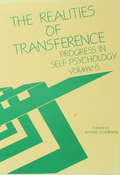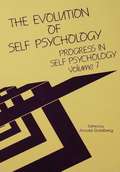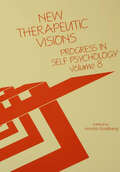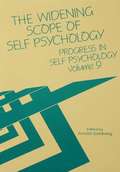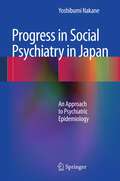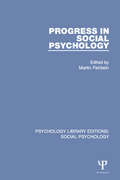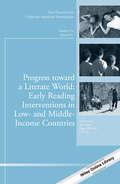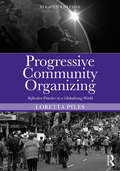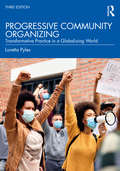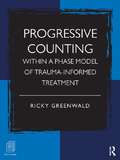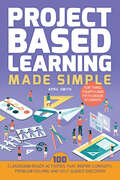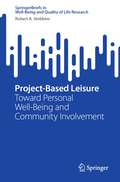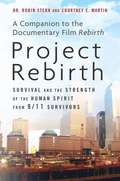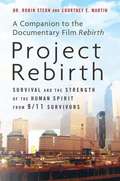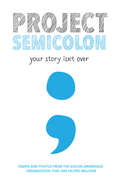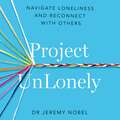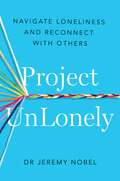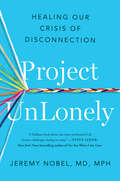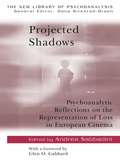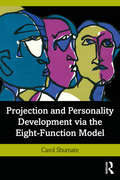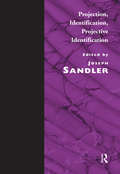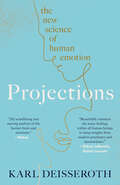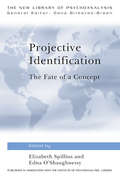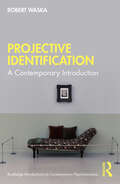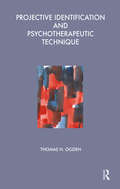- Table View
- List View
Progress in Self Psychology, V. 6: The Realities of Transference
by Arnold GoldbergA collection of thoughtul presentations on transference and countertransference highlights The Realities of Transference, Volume 6 in the Progress in Self Psychology series. The selfobject transferences receive special attention. Elsewhere in this volme, selfobject phenomena are examined in relation to the process of working through, the origins of ambition, the psychology of addiction, the psychodynamic consequences of AIDS, and creativity. An exploration of the selfobjects of the second half of life offers new insight into later development.
Progress in Self Psychology, V. 7: The Evolution of Self Psychology
by Arnold GoldbergA special section of papers on the evolution, current status, and future development of self psychology highlights The Evolution of Self Psychology, volume 7 of the Progress in Self Psychology series. A critical review of recent books by Basch, Goldberg, and Stolorow et al. is part of this endeavor. Theoretical contributions to Volume 7 examine self psychology in relation to object relations theory and reconsider the relationship of psychotherapy to psychoanalysis. Clinical contributions deal with an intersubjective perspective on countertransference, the trauma of incest, and envy in the transference.
Progress in Self Psychology, V. 8: New Therapeutic Visions
by Arnold GoldbergNew Therapeutic Visions begins with Lachmann and Beebe's developmental perspectives on representational and selfobject transferences, followed by commentaries. In Section II, the self-psychological approach is brought to bear on the clinical treatment of an adolescent girl, incest survivors, addictive personalities, patients exhibiting codependency, and a case of desomatization. Section III, on applied self psychology, contains chapters on the theory of creativity; subjectivism, relativism, and realism in psychoanalysis; and quantum physics and self psychology. The final section offers two critical review essays on major contributions to the self psychology literature by Wolf, by Bacal and Newman, and by Lichtenberg. Stolorow's chronicle of his personal odyssey into self psychology and intersubjectivity theory rounds out volume 8 of the Progress in Self Psychology series.
Progress in Self Psychology, V. 9: The Widening Scope of Self Psychology
by Arnold GoldbergThe Widening Scope of Self Psychology is a watershed in the self-psychological literature, being a contemporary reprise on several major clinical themes through which self psychology, from its inception, has articulated its challenge to traditional psychoanalytic thinking. The volume opens with original papers on interpretation by eminent theorists in the self-psychological tradition, followed by a series of case studies and clinically grounded commentaries bearing on issues of sex and gender as they enter into analysis. Two thoughtful reexaminations of the meaning and treatment challenges of chronic rage are followed by clinical papers that focus, respectively, on mourning, alter ego transferences, resistance to change, and pathological identification. Applied analytic contributions and a review of Goldberg's The Prisonhouse of Psychoanalysis round out a collection that testifies not only to the widening scope of self psychology, but to its deepening insights as well.
Progress in Social Psychiatry in Japan
by Yoshibumi NakaneSocial psychiatry is a multidisciplinary field analyzing mechanisms of mental health issues comprehensively to contribute to society using the findings. Those findings include biological, psychological, and social aspects and they are based on psychiatry and connected with a wide variety of academic fields, including psychology, sociology, law, economics, and religious studies. Epidemiological research in psychiatry is a field of study in patients with psychiatric disorder attempting to investigate causes, to develop clinical applications of the results, and to determine applications to health services plans for individuals and/or communities. They are both foundation for understanding biopsychosocial view in psychiatry but not many comprehensive volumes covering the topic were not available until now. This book is thus a unique, comprehensive reference with evidence-based approach to provide concise summary of researches for such as schizophrenia, affective disorders, psychiatric disorders in the general practice setting, and disaster psychiatry, especially for the case of atomic bomb diseases. The studies were mostly carried out in the region of Nagasaki, the prefecture experienced a nuclear attack at the time of World War . Psychiatric findings in mental health problems among atomic bomb survivors and sufferers in Nagasaki has been established and Nagasaki is the only area that fulfills the conditions of the subject of the study of psychiatric epidemiology and social psychiatry which is going to be described in this book. This book provides a valuable resource not only for physicians and researchers in the field of psychiatry and mental health but for people who work for mental health welfare department.
Progress in Social Psychology: Volume 1 (Psychology Library Editions: Social Psychology)
by Martin FishbeinOriginally published in 1980, this title was the first of a new monograph series in social psychology. The editor presents a format for showing the progress of social psychology as a viable, exciting and relevant discipline. <P><P>The papers contained in this volume represent progress in theory and method as well as in basic and applied research. In addition, recognising that not all social psychology is produced by people who label themselves as ‘social psychologists’ the volume contains the contributions of scholars who are best known for their work in other areas.
Progress toward a Literate World: Early Reading Interventions in Low- and Middle-Income Countries: New Directions for Child and Adolescent Development, Number 155 (J-B CAD Single Issue Child & Adolescent Development)
by Amber Gove April Mora Peggy McCardleIn order to work toward eradicating extreme poverty and hunger, the United Nations Millennium Development Goals significantly include universal primary education, gender equality, and empowering women. Effective early literacy instruction plays a critical role in achieving these goals. From around the globe, this issue presents evidence-based, culturally sensitive and cost-effective practices in reading instruction and intervention in the early grades. Not only will this issue heighten awareness of the challenges faced but it will provide valuable information to help guide and improve diverse global education programs and research, especially in developing regions and for children living in poverty or disadvantage in all nations.Presenting several experiences from small- and large-scale reading improvement programs, it: Focuses on low- and middle-income countries, Describes challenges in implementing, studying, and scaling them up, Informs expectations on how quickly and easily reading performance can change, and Provides results and evidence of effectiveness. This is the 155th volume in this Jossey-Bass series New Directions for Child and Adolescent Development. Its mission is to provide scientific and scholarly presentations on cutting edge issues and concepts in this subject area. Each volume focuses on a specific new direction or research topic and is edited by experts from that field.
Progressive Community Organizing
by Loretta PylesThe second edition of Progressive Community Organizing offers a concise intellectual history of community organizing and social movements while also providing practical tools geared toward practitioner skill building. Drawing from social-constructionist, feminist and critical traditions, Progressive Community Organizing affirms the practice of issue framing and offers two innovative frameworks that will change the way students of organizing think about their work. Progressive Community Organizing is ideal for both undergraduate and graduate courses focused on community theory and practice, community organizing, community development, and social change and service learning. The second edition presents new case studies, including those of a welfare rights organization and a youth-led LGBTQ organization. There are also new sections on the capabilities approach, queer theory, the Civil Rights movement, and the practices of self-inquiry and non-violent communication. Discussion of global justice has been expanded significantly and includes an account of a transnational action-research project in post-earthquake Haiti. Each chapter contains discussion questions, written and web resources, and a list of key terms; a full, free-access companion website is also available for the book.
Progressive Community Organizing: Transformative Practice in a Globalizing World
by Loretta PylesNow in its third edition, Progressive Community Organizing: Transformative Practice in a Globalizing World introduces readers to the rich practice of progressive community organizing for social change while also providing concrete tools geared toward practitioner skill building. Drawing from social movement scholarship and social theory, this book articulates a transformative approach to organizing that embraces emergent strategies and healing justice. It emphasizes framing processes and the power of stories using story-based strategy and digital activism. Embracing intersectional organizing, the book addresses topics such as identity politics, microagressions, internalized oppression, and horizontal hostility with attention to recentering and allyship as a growth-oriented journey of solidarity and liberation. Readers will engage with case studies focused on issues such as poverty, racial justice, immigration, housing, health and mental health, and climate crisis. This new edition includes: Expanded content on transformative change approaches including healing justice New content on the role of digital technology and social media in organizing Case studies of the Poor People’s Campaign and Extinction Rebellion Emphasis on the power of stories and story-based strategy for organizing and issue framing Transformative organizations with attention to feminist and decolonized organizational structures and cultures Expanded chapters on strategies and tactics focusing on power analysis and a range of tactics from direct action to resilience-based organizing The book will be of interest to students and practitioners who want to become more skilled in structural analysis, praxis, and self-reflexivity through critical and transformative engagement with historical and current social problems, social movements, and social welfare.
Progressive Counting Within a Phase Model of Trauma-Informed Treatment
by Ricky GreenwaldClinicians recognize trauma & loss as a prominent source of clients' problems. Progressive counting represents a significant advance in trauma treatment, because it is about as efficient, effective, and well-tolerated as EMDR while being far simpler for therapists to master and do well. PC's value has already been supported by two open trials and a controlled study. Are you ready to provide therapy that routinely affects profound healing and lasting change? This book will show you how.
Project Based Learning Made Simple: 100 Classroom-Ready Activities that Inspire Curiosity, Problem Solving and Self-Guided Discovery for Third, Fourth and Fifth Grade Students (Books for Teachers)
by April SmithQuickly and Easily Go from Idea to Activity to Discover with these Ready-to-Use ProjectsProject Based Learning Made Simple is the fun and engaging way to teach 21st-century competencies including problem solving, critical thinking, collaboration, communication and creativity. This straight-forward book makes it easier than ever to bring this innovative technique into your classroom with 100 ready-to-use projects in a range of topics, including: Science and STEM• Save the Bees!• Class Aquarium• Mars ColonyMath Literacy• Personal Budgeting• Bake Sale• Family CookbookLanguage Arts• Candy Bar Marketing• Modernize a Fairy Tale• Movie AdaptationSocial Studies• Build a Statue• Establish a Colony• Documenting Immigration
Project-Based Leisure: Toward Personal Well-Being and Community Involvement (SpringerBriefs in Well-Being and Quality of Life Research)
by Robert A. StebbinsThis short book discusses the relatively new concept of project-based leisure in leisure research, and relates it to individual and community well-being and quality of life. The book defines PBL as a short-term, reasonably complicated, one-off or occasional, though infrequent, creative undertaking carried out in free time, or time free of disagreeable obligation. Such leisure requires considerable planning, effort, and sometimes skill or knowledge. The book discusses how PBL contributes to subjective well-being, though doing so more modestly than serious leisure and occupational devotion. The book surveys existing field research of the author’s own and other studies, and provides original insights on how PBL activities can be used to generate community involvement and subjective well-being.
Project Rebirth: Survival and the Strength of the Human Spirit from 9/11 Survivors
by Courtney E. Martin Robin SternEach year, every year, on the anniversary of the attacks, Jim Whitaker and his film crew interviewed eight people who were directly affected by the events of 9/11. They used five of these subjects and their words as the basis for the documentary Rebirth, which premiered at the Sundance Film Festival in 2011. Based on the film, the book Project Rebirth allows the powerful rediscovery stories of all these individuals - both those featured in the film and those whose stories did not make it onto celluloid - to be shared with the world. Book jacket.
Project Rebirth
by Stern Dr Robin Martin Courtney E.Written in conjunction with the documentary Rebirth, a full decade in the making, an uplifting look at the lives of eight individuals whose lives were forever changed by the events of September 11, 2001.
Project Semicolon: Your Story Isn't Over
by Amy BleuelFor fans of PostSecret, Humans of New York, and If You Feel Too Much, this collection from suicide-awareness organization Project Semicolon features stories and photos from those struggling with mental illness. Project Semicolon began in 2013 to spread a message of hope: No one struggling with a mental illness is alone; you, too, can survive and live a life filled with joy and love. In support of the project and its message, thousands of people all over the world have gotten semicolon tattoos and shared photos of them, often alongside stories of hardship, growth, and rebirth.Project Semicolon: Your Story Isn't Over reveals dozens of new portraits and stories from people of all ages talking about what they have endured and what they want for their futures. This represents a new step in the movement and a new awareness around those who struggle with mental illness and those who support them. At once heartfelt, unflinchingly honest, and eternally hopeful, this collection tells a story of choice: every day you choose to live and let your story continue on.Learn more about the project at www.projectsemicolon.com.
Project UnLonely: Navigate Loneliness and Reconnect with Others
by Jeremy NobelDr Jeremy Nobel offers practical solutions to the growing crisis of loneliness.Chronic loneliness is a private experience of profound anguish. It has also become a public health crisis. The Unlonely Project will not just sound an alarm about the significant, growing negative impact of loneliness on nearly every sector of society, but also offer solace, hope and solutions.While we can't cure loneliness the way we can cure strep throat or even cancer, there are concrete, actionable and effective things we can do to manage it and keep it from becoming chronic. For an individual lonely listener, or for anyone who loves, serves, treats, or employs people vulnerable to loneliness in community, work or educational settings, this audiobook will clarify how meaningful reconnection between the self and others begins, and how it can be nourished and sustained.(P)2023 Penguin Audio
Project UnLonely: Navigate Loneliness and Reconnect with Others
by Jeremy NobelEven before 2020, chronic loneliness was a private experience of profound anguish that had become a public health crisis. Since then it has reached new heights. While we can't cure loneliness the way we can cure strep throat or even cancer, there are concrete, actionable and effective things we can do to manage it and keep it from becoming chronic. For an individual lonely reader, or for anyone who loves, serves, treats, or employs people vulnerable to loneliness in community, work or educational settings, this book will clarify how meaningful reconnection between the self and others begins, and how it can be nourished and sustained.Loneliness assumes many forms, from enduring physical isolation to feeling rejected because of difference, and it can have devastating consequences for our physical and mental health. As the founder of Project UnLonely, Dr. Jeremy Nobel unpacks our personal and national experiences of loneliness to discover its roots and to show how we can take steps to find comfort and connection. Dr. Nobel brings together many voices, from pioneering researchers, to leaders in business, education, the arts, and healthcare, to lonely people of every age, background, and circumstance. He discovers that the pandemic isolated us in ways that were not only physical, and that, at its core, a true sense of loneliness results from a disconnection to the self. He clarifies how meaningful reconnection can be nourished and sustained. And he reveals that an important component of the healing process is engaging in creativity, a powerful opportunity he shows us can be accessed by all. Project UnLonely will not just sound an alarm about the significant, growing negative impact of loneliness on nearly every sector of society, but also offer solace, hope and solutions. Supportive and clear-eyed, this is the book we will take into our new normal and rely on for years to come.
Project UnLonely: Healing Our Crisis of Disconnection
by Jeremy NobelInsight into our new world of loneliness that offers solace, hope, and solutions.Even before 2020, chronic loneliness was a private experience of profound anguish that had become a public health crisis. Since then it has reached new heights. Loneliness assumes many forms, from enduring physical isolation to feeling rejected because of difference, and it can have devastating consequences for our physical and mental health. As the founder of Project UnLonely, Jeremy Nobel unpacks our personal and national experiences of loneliness to discover its roots and to show how we can take steps to find comfort and connection. Dr. Nobel brings together many voices, from pioneering researchers, to leaders in business, education, the arts, and healthcare, to lonely people of every age, background, and circumstance. He discovers that the pandemic isolated us in ways that were not only physical, and that, at its core, a true sense of loneliness results from a disconnection to the self. He clarifies how meaningful reconnection can be nourished and sustained. And he reveals that an important component of the healing process is engaging in creativity, a powerful opportunity he shows us can be accessed by all. Supportive and clear-eyed, this is the book we will take into our new normal and rely on for years to come.
Projected Shadows: Psychoanalytic Reflections on the Representation of Loss in European Cinema (The New Library of Psychoanalysis)
by Andrea SabbadiniProjected Shadows presents a new collection of essays exploring films from a psychoanalytic perspective, focusing specifically on the representation of loss in European cinema. This theme is discussed in its many aspects, including: loss of hope and innocence, of youth, of consciousness, of freedom and loss through death. Many other themes familiar to psychoanalytic discourse are explored in the process, such as: Establishment and resolution of Oedipal conflicts Representation of pathological characters on the screen Use of unconscious defence mechanisms The interplay of dreams, reality and fantasy Projected Shadows aims to deepen the ongoing constructive dialogue between psychoanalysis and film. Andrea Sabbadini has assembled a remarkable number of internationally renowned contributors, both academic film scholars and psychoanalysts from a variety of cultural backgrounds, who use an array of contemporary methodologies to apply psychoanalytic thinking to film. This original collection will appeal to anyone passionate about film, as well as professionals, academics and students interested in the relationship between psychoanalysis and the arts.
Projection and Personality Development via the Eight-Function Model
by Carol ShumateJung considered personality development critical for the survival of the human race, not just for personal fulfillment, but how can personality be developed? Carol Shumate shows how John Beebe’s revolutionary eight-function/eight-archetype model of personality type can be applied to guide development for each of the sixteen Myers-Briggs types, making explicit the implications of Jung’s eight-function model. Based on reports from participants at Beebe’s workshops and using examples of historic figures like Abraham Lincoln, this is the first book to detail how the unconscious aspects of the functions tend to manifest for each type. Projection and Personality Development via the Eight-Function Model can assist readers in realizing the transformation that Jung himself experienced. It will be key reading for Jungian analysts and psychotherapists, academics and scholars of Jungian and post-Jungian studies, and practitioners of psychological type.
Projection, Identification, Projective Identification
by Joseph SandlerThis book focuses on all aspects of projection and identification, and addresses the problems and perplexities of projective identification. It is based on the First Conference of the Sigmund Freud Center of the Hebrew University of Jerusalem.
Projections: A Story of Human Emotions
by Karl DeisserothA groundbreaking tour of the human mind that illuminates the biological nature of our inner worlds and emotions, through gripping, moving—and, at times, harrowing—clinical stories&“Poetic, mind-stretching, and through it all, deeply human.&”—Daniel Levitin, New York Times bestselling author of The Organized MindKarl Deisseroth has spent his life pursuing truths about the human mind, both as a renowned clinical psychiatrist and as a researcher creating and developing the revolutionary field of optogenetics, which uses light to help decipher the brain&’s workings. In Projections, he combines his knowledge of the brain&’s inner circuitry with a deep empathy for his patients to examine what mental illness reveals about the human mind and the origin of human feelings—how the broken can illuminate the unbroken.Through cutting-edge research and gripping case studies from Deisseroth&’s own patients, Projections tells a larger story about the material origins of human emotion, bridging the gap between the ancient circuits of our brain and the poignant moments of suffering in our daily lives. The stories of Deisseroth&’s patients are rich with humanity and shine an unprecedented light on the self—and the ways in which it can break down. A young woman with an eating disorder reveals how the mind can rebel against the brain&’s most primitive drives of hunger and thirst; an older man, smothered into silence by depression and dementia, shows how humans evolved to feel not only joy but also its absence; and a lonely Uighur woman far from her homeland teaches both the importance—and challenges—of deep social bonds.Illuminating, literary, and essential, Projections is a revelatory, immensely powerful work. It transforms our understanding not only of the brain but of ourselves as social beings—giving vivid illustrations through science and resonant human stories of our yearning for connection and meaning.
Projective Identification: The Fate of a Concept (The New Library of Psychoanalysis)
by Elizabeth Spillius Edna O’ShaughnessyIn this book Elizabeth Spillius and Edna O'Shaughnessy explore the development of the concept of projective identification, which had important antecedents in the work of Freud and others, but was given a specific name and definition by Melanie Klein. They describe Klein's published and unpublished views on the topic, and then consider the way the concept has been variously described, evolved, accepted, rejected and modified by analysts of different schools of thought and in various locations – Britain, Western Europe, North America and Latin America. The authors believe that this unusually widespread interest in a particular concept and its varied ‘fate’ has occurred not only because of beliefs about its clinical usefulness in the psychoanalytic setting but also because projective identification is a universal aspect of human interaction and communication. Projective Identification: The Fate of a Concept will appeal to any psychoanalyst or psychotherapist who uses the ideas of transference and counter-transference, as well as to academics wanting further insight into the evolution of this concept as it moves between different cultures and countries.
Projective Identification: A Contemporary Introduction (Routledge Introductions to Contemporary Psychoanalysis)
by Robert WaskaThis clear and thoughtful book by Robert Waska provides an accessible introduction to Projective Identification and the role it plays in internal and external life. Waska explores how Projective Identification is the foundation for much of psychic life, driving internal phantasy, influencing interpersonal behavior, and contributing to the transference/countertransference environment. This book contains several case studies which explore and expand on the concepts described and which demonstrate how a psychotherapist can understand, contain, and interpret the states patients seek help with. Additionally, this book introduces a clinical technique which is intended to tame the underlying emotional conflicts. Part of the popular Routledge Introductions to Contemporary Psychoanalysis series, this book will be essential to students of psychoanalysis, as well as academics and practitioners familiarising themselves with Projective Identification in a clinical setting.
Projective Identification and Psychotherapeutic Technique
by Thomas OgdenThis book examines the projective identification and its clinical uses from a Kleinian perspective. It applies the perspective of projective identification to various aspects of the psychotherapy of borderline and schizophrenic patients.
